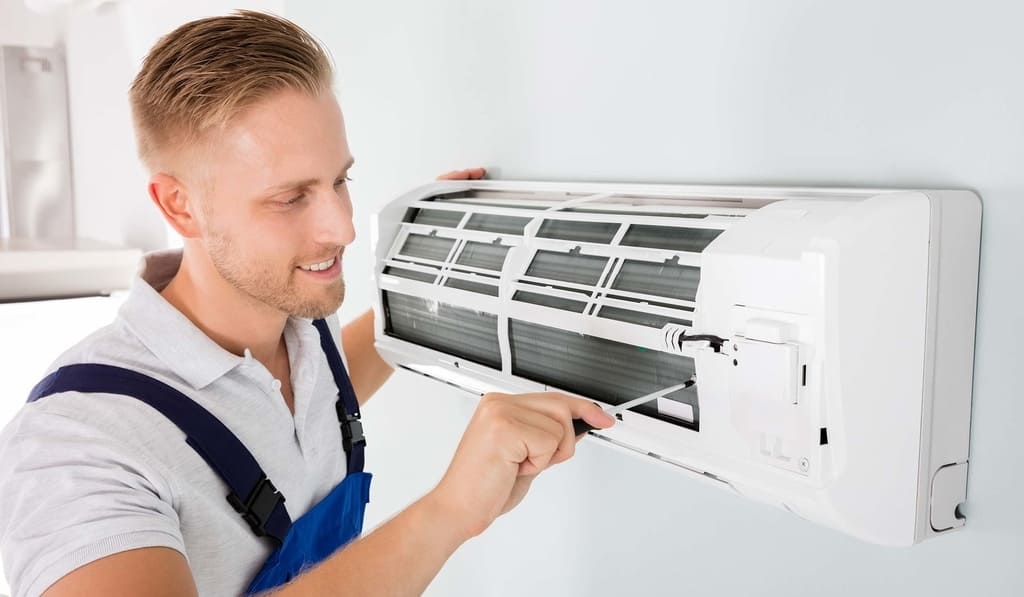With summer temperatures rising to record levels, the air conditioners in our homes and apartments will be put to the ultimate test. And if you have a wall air conditioner, there’s a good chance you could encounter issues stemming from heavy use. If it’s becoming a greater challenge every day to keep your home cool, it might be time to replace your wall AC unit. But how do you know if your warm weather woes are a minor maintenance issue or require a full replacement of your air conditioner? Read on to learn how to tell the difference.
How Long Does the Typical Wall Air Conditioner Last?
Typical wall air conditioners last between eight and ten years. This range may vary in either direction depending on the quality of the unit, average climate, and level of care.
Signs Your Wall AC Unit May Need to Be Replaced
If your wall air conditioner is reaching the limits of the average lifespan, it’s time to start paying close attention to some leading signs that it’s time to replace the unit.
Sign #1 – The Unit Is Making Strange Sounds
When your wall air conditioner starts making strange sounds, that’s a strong sign that major components are beginning to near the end of their life. If you start to hear sounds like squealing, scraping, grinding, or bangs and pops, there’s a good chance it’s time to buy a new unit.
Sign #2 – Odd Odors In The Air
The air coming from the wall AC unit should never smell bad. If smells are emanating from the unit as it runs, it might be time to replace it. If there’s a burning smell, wiring could be the issue, which means it’s time to replace the wall ac unit. Mold and mildew can sometimes be cleaned from filters, but if the odor persists, it’s time to replace the system.
Sign #3 – Increasing Energy Costs
If you’ve been noticing your electric bills increasing more and more in relation to the same time frames and outside temperatures, it could be a sign the wall AC unit has lost its refrigerant or has a failing compressor. If cleaning the filter doesn’t help, it’s likely time to buy a new unit.
Sign #4 – The Unit Cycles On And Off Too Much
When a wall air conditioner keeps cycling on and off frequently, it’s a sign the system isn’t paired well with the space. Every unit has a BTU output rating, and it’s possible the rating is too high for the area being cooled. Buying a unit that’s correctly sized will save energy and maximize its lifespan.
Sign #5 – The AC Unit Shoots Debris Into The Room
Sometimes AC units can build up debris inside from deteriorating filters, dusty environments, and leaves that get sucked into it. When debris is being regularly ejected from the unit, it’s likely time to buy a new one.
Can A Wall Air Conditioner Be Repaired ?
When you’re almost sure your wall air conditioner has reached the end, you might be wondering if you can just repair it instead of replacing it entirely. Depending on the age of the unit, this may be worthwhile if the repair parts are affordable, but most wall AC units are fairly affordable, making this a challenge. Let’s cover some of the repair possibilities.
Try Cleaning The Unit
If your wall ac unit isn’t blowing as strong or as cold as it once did, the first step is to clean the filter and outside intake. Sometimes, this step alone can buy you another couple of years of operation if the unit is only six or eight years old.
Clear Out The Condenser Fins
Sometimes the space around the evaporator and the condenser fins get packed with debris, which can inhibit the unit’s ability to cool. Try cleaning these components by using compressed air and a vacuum to suck out deep-seated dust and debris. If the fins are bent, straighten them with a knife or fin comb.
What To Look For In A New Wall Air Conditioner
Once you’ve concluded it’s time to buy a new wall air conditioner, it’s important to be sure to keep an eye on some key traits for the best results. Be sure to choose a unit that has a high enough BTU output for the square footage you’re cooling, but avoid going too big, as this can actually hurt efficiency. Next, check the size to be certain it will fit in your wall opening. Finally, check the Energy Star rating for a general idea on how much the unit will cost to operate each year. Beyond these factors, most features will be for convenience, so carefully consider your options if you want the ease of remote operation or timer functions.
We hope this quick guide to replacing your wall air conditioner serves you well this summer. Stay cool, and stay safe!








